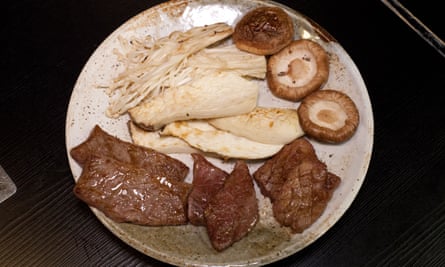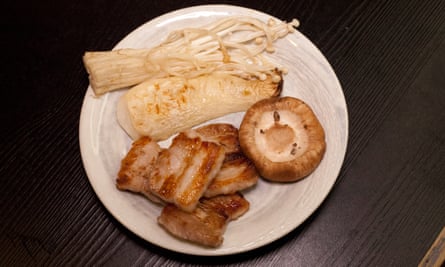Hachi Japanese BBQ, 56 Brewer Street, London W1F 9TJ. Starters and sides £5.80-£11.20, grill platters £7.80-£139.70, desserts £3.20, beer from £5.60, sake from £11.80 a glass
For a restaurant where it’s possible to spend significant amounts of money, Hachi, in London’s Soho, doesn’t look like much. It has a narrow exterior of black brick. There is something eager about the window display: multiple menus, some with pictures of food; a shelf with emptied bottles of Japanese liquor, as if to say that good times have been had here. For a while there was a TV screen in the window showing cuts of beef and later a chiller cabinet, filled with slabs of animal. The small dining room doesn’t look like much either: walls clad in fake brick and hung with cartoony images of animals indicating their various cuts; wide black tables inset with grills; a semi-open kitchen.
There are many restaurants I walk past, but never think of visiting. Hachi, which has been there for six years, is one of them. Then one day I stopped and looked. Properly looked. Hachi, which is the Japanese for eight, is a Yakiniku or grill restaurant. It’s similar to a Korean BBQ restaurant. Except that there is a USP: a profound interest in wagyu, the hyper-expensive beef famed for its lacy marbling of fat which, at its most intense, can make the muscle appear pink rather than red. Standard, well-aged sirloin can cost £45 a kilo. Depending on its grade and origin, the wagyu equivalent can cost anywhere from £150 to £300 a kilo.

A certain kind of hungry, self-consciously discerning person is meant to become sweaty palmed at the mere whisper of the word wagyu; an implication of luxury and exclusivity and the preciseness of the Japanese aesthetic (though much of what’s available here comes from British herds that lead lovely, grass-fed, pampered lives). Others eat mere steak. I shall eat wagyu, for I have deeper pockets, wider arteries and a prescription for statins. Along with caviar, lobster and truffles it is one of the four horsemen of the Oligarcalypse, a word I just coined, but which feels precision-tooled for our times.

I have long been suspicious of all this. With wagyu it’s partly because the cult of marbled beef demands an interest in graded products, as if you can use a ruler to work out whether your lunch is any good or not. But it’s also because the very thing that some treasure, the marbling, looks to me like so much structured fat. Don’t get me wrong. I’m a big fan of fat. It’s where the flavour is. If you roasted me, I’d be delicious. But it needs to be a part of the narrative, not the whole story. Occasionally, I hear people talk ecstatically about the tenderness of a fiercely expensive wagyu steak. If I eat a steak, which is not something we should do often, I don’t want my meat to be like butter. I want it to be like beef.

Then I remember that in matters of food I am supposed to be some sort of libertine, open to all possibilities. So a table was booked at Hachi and a party rounded up, for these experiences are always better managed mob-handed. The bottom line: Hachi is a total gas. In a town full of restaurants where it often feels like the expense goes on making you feel better about yourself – on the white linen tablecloths or the battalions of heel-clicking waiters – it’s reassuring to know that money spent here goes on ingredients; on the platters of meat and vegetables, delivered without flummery. They arrive complete with neatly printed place cards, like they are guests at a classy wedding.
Be warned. Hachi has many menus. There are multi-course offerings, from just under £40 a head to well over £100. There’s a lengthy à la carte and, on the table when we arrive, a printed list of specials and others on come-hither laminated flash cards. Try not to be baffled. Choose a few starters and follow that with something for the grill. You can always order more later. We have both their chicken and squid karaage, first soy and garlic-marinated then deep fried in a richly crenelated batter, until they are golden and greaseless. Alongside we have pan-blistered Padrón peppers, from the Spanish part of Japan. I’m not quibbling. They are big, satisfying specimens. You can also have chips dusted with ground-up nori. Hachi is not doctrinaire.

Then the lid comes off the table-top grill and the elements are powered up. We have two servings of wagyu, which arrive in four perfectly cut lozenges of seasoning-dusted ribeye for £41.60 and of rump for £24.80. If I’m ever going to eat it, and it really won’t be often, this has to be the way: as a taster, cooked briefly over intense heat so the surface has caramelised and the fat has just started to run. We add a little salt and the profound beefy flavour pops. It is mouth-coating. And then it is gone. Perhaps you find the sound of all this appalling. Perhaps you are outraged. I do understand. My advice: don’t go there.
Or, order the mixed platter of mushrooms with shiitake, planks of king oyster and bushels of delicate enoki. We dip them in sesame seed-spiked soy and add them to the grill where they caramelise nicely, alongside pieces of pork belly and salted beef tongue, cut thinly. There are dipping bowls of mixed spring onion and ginger and another of a light BBQ sauce with an egg yolk in the middle. For carbs we have a special of fried rice with garlic and truffle, because we are deep into this ludicrous Oligarcalypse territory now, and enjoying ourselves immensely. It, too, comes with the morning sun promise of an egg yolk, which is broken up into the rice to make it just a little stickier.

Hachi’s few tables are filled now, with groups peering in excitedly at the smoking grill. Pictures are taken and videos shot. Send all this on its way with bottles of Asahi, or a yuzu sour cocktail served in a dimpled pint glass. There is a range of shochu made from sweet potato, wheat or rice as well as a good list of sakes. They are always in need of emptied bottles for the window display. We finish with matcha-flavoured mochi and a scoop of icy yuzu sorbet, served more as palate cleanser than dessert. The bill for this is not small, but then if you are going to eat these sorts of ingredients, it really shouldn’t be. Most importantly, Hachi is proper fun. And proper fun has its own profound value.
News bites
The charity Refugee Community Kitchen, which supports homeless people in London and Edinburgh as well as displaced people in Northern France, has launched a winter fundraiser. They are aiming to raise £50,000 to pay for the ingredients, energy and equipment they need for their meal service, provided alongside medical and legal advice. Find out more and donate here.
For the first time in almost two decades, the three Michelin star Fat Duck in Bray is launching an a la carte menu, to run alongside its £295 “Journey” tasting menu. The a la carte will cost £195 at lunchtime and £225 in the evening, and will feature Fat Duck classics including crab risotto, snail porridge and bacon and egg ice-cream. The new menu launches on 5 February to mark the restaurant’s 30th birthday. The move is part of a trend for high-end restaurants to move away from tasting menu-only formats (thefatduck.co.uk).
Matthew Harris, formerly of Bibendum (and brother of Henry of Bouchon Racine) is to open a new French restaurant at the Gallivant Hotel by Camber Sands near Rye, West Sussex. Harry’s, which opens in February, will feature house made terrines, alongside dishes using local fish and Romney salt marsh lamb (thegallivant.co.uk).
Email Jay at [email protected] or follow him on Instagram @jayrayner1

.png) 1 month ago
7
1 month ago
7













































